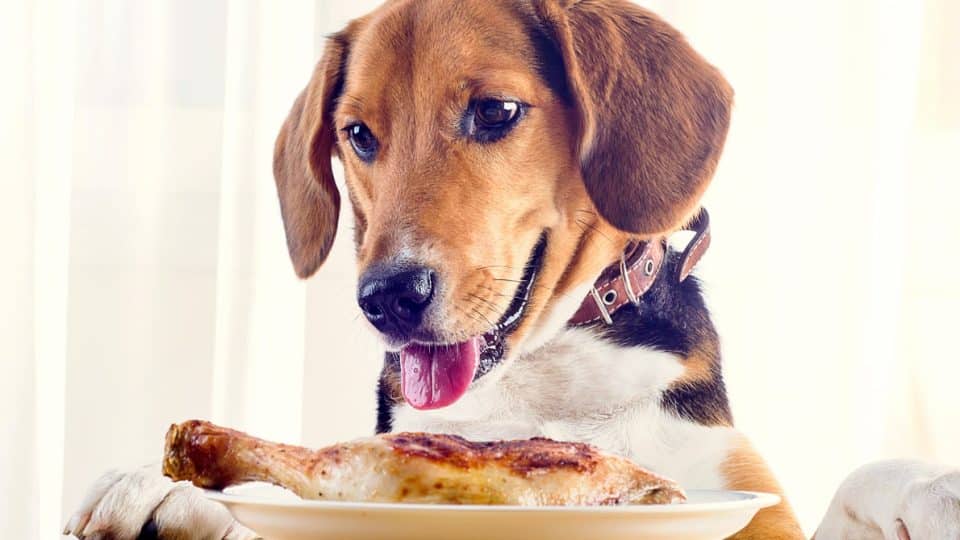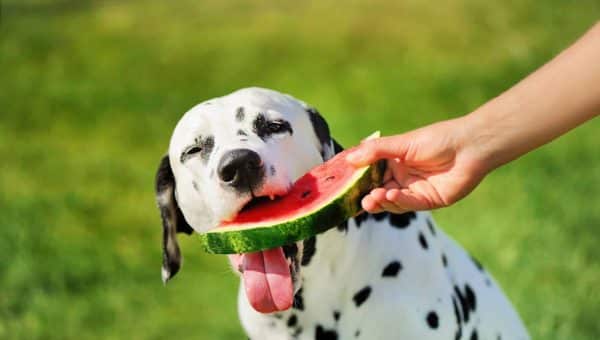When it comes to our dogs, we want to ensure they receive the best nutrition possible. Dogs are frequently labelled as meat lovers, so dog parents might wonder whether chicken is safe for them to eat. Yes, dogs can eat chicken.
Meaghan Thomas, DVM from East Ridge Animal Hospital in the USA, says chicken is a safe, lean protein for dogs in small amounts as long as they don’t have an allergy to it. However, she says pet parents should still feed their dogs a normal diet to avoid weight gain and obesity. She says that by feeding your dog approved pet food, they should have a complete and balanced meal. So, “feeding something like chicken would be for enrichment purposes,” she adds. “Introduce it as you would any other new food item—in small amounts to make sure your pet can tolerate it without GI [gastrointestinal] upset.”
Chicken can be a healthy meat addition to a dog’s diet when prepared and offered appropriately. In this article, we will explore the benefits of feeding chicken to dogs, potential risks to be cautious of, different cooking methods, safe chicken parts for consumption, and the recommended daily limit for chicken intake.
Why is Chicken Good for Dogs?
Chicken is a great source of lean protein, which is essential for a dog’s overall health. Protein is crucial for maintaining and repairing tissues, supporting the immune system, and providing energy. Additionally, chicken contains essential amino acids necessary for a dog’s wellbeing. These nutrients help promote healthy muscle development, skin, and coat condition, making chicken a valuable addition to their diet.
What To Avoid When Feeding Your Dog Chicken
“I never recommend feeding any seasoned food item; a lot of the seasonings we use—like garlic and onions—are toxic to dogs,” Dr Thomas explains. “It’s always better to feed your dogs plain, skinless meat.” While chicken can be beneficial for dogs, she says to keep these precautions in mind.
- Bones. Avoid giving dogs cooked chicken bones, as they can splinter and pose a choking hazard or cause intestinal damage. If you want to offer them bones, consider giving them raw bones that are safer for consumption.
- Seasonings. Seasonings like salt, herbs, spices, and sauces added to chicken can be harmful to dogs. It’s best to serve them plain, unseasoned chicken to avoid any potential adverse reactions.
- Preparation and cooking. Properly handling and cooking chicken is vital to avoid any contamination and bacteria, like salmonella. Make sure the chicken is thoroughly cooked and free of any additives harmful to dogs.
When introducing chicken to a dog’s diet, it’s essential to do so gradually. Start by offering small portions to see how your dog’s digestive system responds. Additionally, consider consulting with a vet or nutritionist to determine the appropriate amount of chicken based on your dog’s breed, size, age, and overall health.
What Types of Cooked Chicken Can Dogs Eat?
Different cooking methods can impact the safety and suitability of chicken for dogs. Some cooking methods, like frying or seasoning with certain ingredients, can present risks for our canine companions. It’s crucial to understand the various cooking methods and the precautions to take when offering chicken to your dog.
Here’s a table to clarify the safety of different cooking methods:
| Cooking Method | Safe for Dogs? | Suggested Precautions |
| Roasted | Yes | Remove excess fat and avoid using seasonings or spices |
| Grilled | Yes | Avoid using BBQ sauces or high-sodium marinades |
| Steamed | Yes | Serve plain chicken without any added seasonings |
| Boiled | Yes | Avoid using any spices or salt during cooking |
| Sauteed | No | This method typically implies using high-fat cooking methods, and potentially poisonous seasonings like garlic and onion |
| Fried/Air fried | No | Fried chicken is not recommended for dogs |
| Baked | Yes | Serve plain chicken without any added seasonings |
| BBQ | No | BBQ chicken often contains seasonings and sauces unsuitable for dogs |
| Braised | Yes | Serve plain chicken without any added seasonings |
| Poached | Yes | Serve plain chicken without any added seasonings |
| Rotisserie | No | This method typically uses high salt and other seasonings |
| Smoked | Yes | Unseasoned and skinless |
Can Dogs Eat Raw Chicken?
Some people opt to feed their dogs raw meat, including chicken. However, feeding raw chicken to dogs comes with potential risks. Raw chicken may contain harmful bacteria like salmonella, which can lead to foodborne illnesses in both dogs and humans. Symptoms of salmonella poisoning in dogs may include vomiting, diarrhoea, lethargy, and fever.
It is generally recommended to avoid feeding dogs raw chicken and opt for cooked chicken instead.
What Parts of The Chicken Are Safe for Dogs to Eat?
Dogs can consume various parts of the chicken but be mindful of potential hazards. While some pet parents may feed their dogs the entire chicken, it’s safer to stick to certain parts to avoid bones. The following table outlines safe chicken parts for dogs and their nutritional benefits.
| Chicken Part | Healthy for Dogs? | Benefits for Dogs |
| Chicken breast | Yes | Lean protein, low in fat, and easy to digest |
| Chicken thigh | Yes | Contains essential nutrients and vitamins |
| Chicken liver | Yes | Rich in iron and vitamins A and B |
| Chicken heart | Yes | High in taurine, an amino acid essential for heart health |
| Chicken gizzard | Yes | Good source of protein and low in fat |
Can Chicken Replace A Full Meal for a Dog?
In some cases, a veterinarian may recommend chicken as a suitable meal replacement for dogs. Chicken can serve as a temporary alternative for dogs with specific dietary needs or health conditions. Its high protein content and easily digestible nature make it a viable option for short-term meal substitutions.
However, make sure your dog’s nutritional needs are met comprehensively. If you want to replace meals with chicken, consult with a veterinarian to determine the appropriate supplements or additional food items necessary to maintain a balanced diet for your dog.
How Much Chicken Can My Dog Eat Every Day?
The recommended daily limit of chicken for dogs varies based on their size, age, and individual health needs. Generally, chicken should not exceed 10% of your dog’s daily caloric intake.
Larger dogs may be able to consume slightly more chicken, but it’s essential to avoid excessive chicken consumption as it may lead to nutritional imbalances.
What Other Meats Can Dogs Eat?
Chicken can be a healthy and tasty addition to a dog’s diet when served in moderation and prepared appropriately. It provides valuable nutrients and protein that support their overall health and wellbeing. Since chicken is great for dogs, pet parents might wonder if other meats are healthy for them too. The following meats are safe for dogs to eat (in moderation).
When in doubt, always consult with a vet or a qualified nutritionist to ensure you’re making the best dietary choices for your dog. With proper care and attention, you can safely incorporate chicken or other meats into your dog’s diet and provide them with a nutritious and delicious treat.





